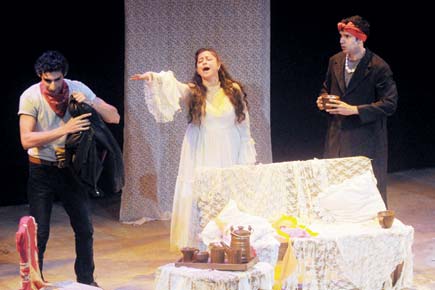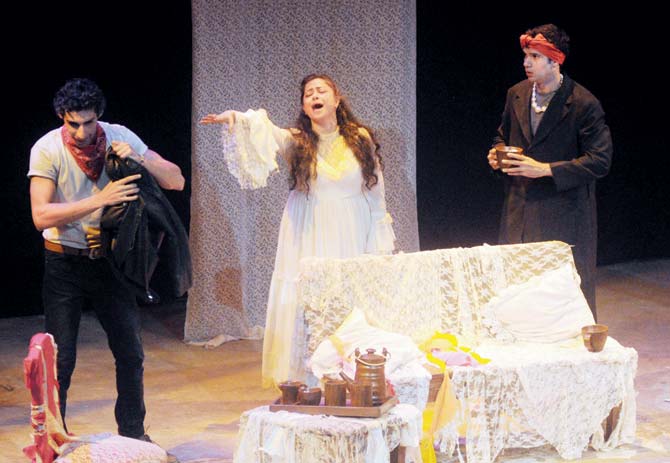It’s only in the theatre that women over a certain age are even seen as individuals, not necessarily defined by their relationship to the men in their lives

 It’s only in the theatre that women over a certain age are even seen as individuals, not necessarily defined by their relationship to the men in their lives. And, when there is a portrayal of old age, it is invariably melodramatic or morbid or both. Parents abandoned by selfish children and suchlike. Two plays premiering at the NCPA’s Centrestage Theatre Festival have a rather unique take on age and death — cleansed of all traces of tragedy. Earlier there had also been a Gujarati play titled Nanimaa, in which an independent old women teaches her grandson a lesson or two about life (Disclosure: The writer works with the NCPA).
It’s only in the theatre that women over a certain age are even seen as individuals, not necessarily defined by their relationship to the men in their lives. And, when there is a portrayal of old age, it is invariably melodramatic or morbid or both. Parents abandoned by selfish children and suchlike. Two plays premiering at the NCPA’s Centrestage Theatre Festival have a rather unique take on age and death — cleansed of all traces of tragedy. Earlier there had also been a Gujarati play titled Nanimaa, in which an independent old women teaches her grandson a lesson or two about life (Disclosure: The writer works with the NCPA).

Actors enact The Living Room at NCPA’s Experimental Theatre on Sunday
ADVERTISEMENT
Miss Cuckoo, directed by Meera Khurana (written by Adhir Bhatt and Bobby Nagra) has a most unusual protagonist. Pratibha Rastogi (Seema Pahwa), who prefers to go by her stage name Miss Cuckoo, is brought by her son and daughter-in-law (Aseem Hattangady-Dilshad Edibam Khurana), to an old age home for performing artists called Golden Oldies. She is a sharp-tongued and outspoken woman, who doesn’t want pity. When the manager of the home, Chacko (Kashin Shetty), tells her family can come visit her often, she says, “Why? Don’t they have anything better to do?” She admits that she could get along with her daughter-in-law if she wanted to, but their strife spices things up.
Still, a home for senior citizens is not where she’d rather be, the stage and film star in her craves attention. Much to Chacko’s horror, she changes with the windows open, and walks around the corridors in the buff. Being cooped up with other old people does nothing for her morale—she listlessly listens to the radio, reads poetry and gossips with another inhabitant of the home (Khurana), who excitedly carries news of scandalous going-on.
It is obvious that Miss Cuckoo must have been a hell-raiser in her youth, and that prevented her from reaching the heights of stardom that she deserved; the major male stars did not want to work with her. She says, without any embarrassment, that she doesn’t know who the father of her son is —“must be one of the men in the drama company.” — but in a moment of introspection also admits that women of her time were exploited, because they did not have a choice.
Miss Cuckoo sparkles again when a pushy young show promoter (Pawan Uttam) comes into her life, though years of fending for herself have taught her to spot a lie, and she is not taken in by his flattery. When she sees his business card sporting an upmarket address, she voices her suspicions, which prove to be correct.
Normally, people don’t expect a senior citizen, who could be anything between ‘70 and 103’, to have sex appeal, but Pahwa plays Miss Cuckoo with an unholy glee that proves that age has nothing to do with a woman’s self worth, or self image.
The protagonist of The Living Room, written and directed by the very talented Kalki Koechlin, is also an elderly lady of indeterminate age. Ana Nil (Sheeba Chadha) is described as an old lady, but she is astute and fleet of foot, dressed in a lacy white night gown, dozing on her living room couch, oblivious to the thunder and lightning raging outside. She wakes up to find Death (Neil Bhoopalam) sitting in her ex-husband’s chair. This must be a rare play about death that is not gloomy — to begin with death has pale blue skin and is dressed in women’s clothes, to comic effect. He explains that is the first time he has a body, and want remains unsaid is that he probably didn’t know what to wear.
Ana thinks this strange man in her house must mean she is part of some reality show, and she spend the next minutes posing for an invisible camera. She also phones her ex-boyfriend Joe (Tariq Vasudeva), who figures out something is not quite right. Then Ana’s energetic godson Born Kuber (Jim Sarbh) lands up, he phones Dr Zeus (also Vasudeva in a Gorucho Marx get-up) who finds the patients lack of pulse and heartbeat odd.
Through the surrealism of the play — the sequence when Ana sees her life flash by (it is believed this is what happens when a person is close to death) which is beautifully choreographed — Ana remains quite unfazed. In the midst of the chaos in her living room, she remembers the ginger cookies in her oven, which even tempt death. She is a woman who has experienced suffering, but her lust for life is undimmed — she has the nerve to tell death that she isn’t ready.
Women like Miss Cuckoo and Ana Nil would never appear in Indian films; they have to step on stage, look the audience in the eye, and say, “Old? Who, me?”
Deepa Gahlot is an award-winning film and theatre critic and an arts administrator. She tweets at @deepagahlot
 Subscribe today by clicking the link and stay updated with the latest news!" Click here!
Subscribe today by clicking the link and stay updated with the latest news!" Click here!







